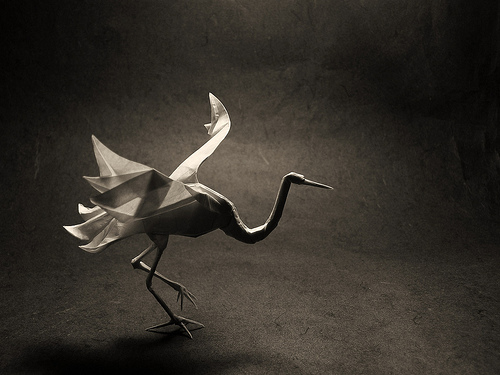A Menagerie, A Road
by Rose Lemberg and Shweta Narayan

adapted from Grulla by Emre Ayaroglu.
Like a procession of animals dimly or joyfully seen against the horizon's receding light, the poems in this issue tempt you into wondering whether they could be contained — in a menagerie, or in a magazine issue — whether they could be separated, explained, examined, held on display — if only for a while. But every attempt to constrain them is bound to fail, for how indeed can one trap a unicorn, or catalog a salmon spawning on the floor of an old house? The creatures change shape, they slip through fingers, bars, words. They escape. They hang around corners, daring you to look.
Some of them are aliens. Some of them might be you.
And who's watching, anyway? "You" is not a comfortable proposition to consider. In "Cinderella Begins Her Memoir", JT Stewart's you demands to be surprised, while Dominik Parisien's you pushes nails through my pupils, and in Ishita Basu Malik's "flood", you are still feeling "that tidemark on your throat." Michele Bannister's "Foam, Braided with Teeth" pulls at the tension between scientific truths, like the discovery of the Denisovan genome, and the always real-unreal nature of viewpoint. I don't know if you should trust us. But at the same time, the poem's speakers say, "you are carved out of us."
This duality is one of the issue's central tensions — between what's seen and what is constructed as seen, between what's real and what is folded into illusory processions hidden and revealed through words that mislead and yet tell the truth. In Brianna Belle Sulzener's "Returns", the narrator's interpretation of one of the poem's main characters may differ sharply from the reader's. Neile Graham's joyous "With Bats in Our Belfry, Dear, Earth Water and Sky" undermines the psychophobic underpinnings of the phrase, and reassures us with "how we thrived." What do we trust, which viewpoint should we identify with? When does you shift to us? This issue is full of turns, unexpected moves and transformations.
How appropriate, then, that it contains Stone Telling's very first feature — of JT Stewart, whose poems are in many ways tricksters. Varied in tone, shifting from melancholy to anger to confident truthspeaking, these works have in common the precise, nuanced and raw perspectives of the characters. It is up to the reader to figure out whether to trust them, what is it that they say, the truths they speak about you. About us.
Trusted or not, tricksters show up when they are most needed. And we needed this issue. We needed its upending of convention, its truthspeaking, but also — these last few months have been exceptionally difficult for all of us on team Stone Telling, and we really needed this issue's sense of play, its whimsy, its light to lead us through darkness. The creatures, the beings of the menagerie are a procession, a journey that leads from pain into hope.
We hope it answers a need for you, too.

